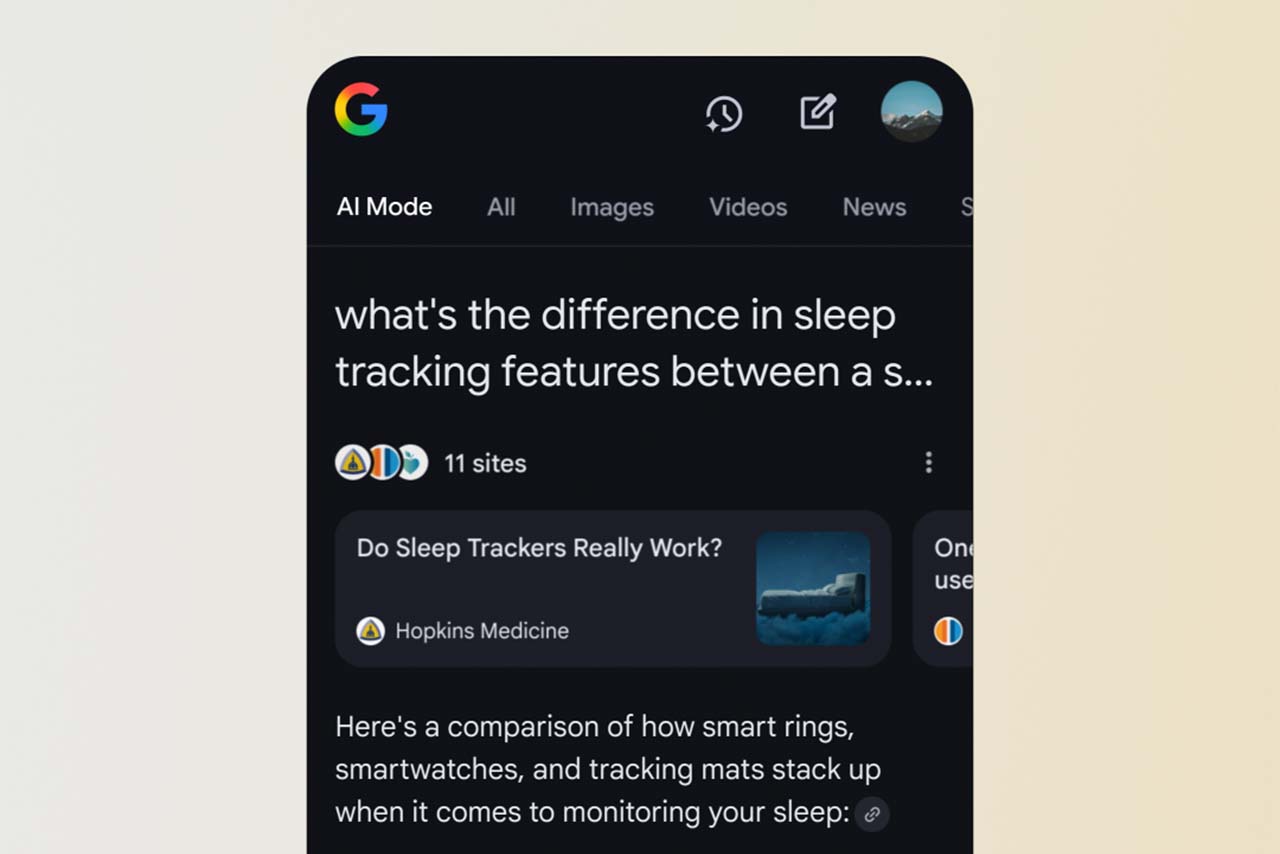Google rolled out its “most powerful” AI search yesterday (29 July) with AI Mode in the UK.
Appearing as a tab on Google Search, it has more advanced reasoning, and using Gemini 2.5, people can type, speak or take a photo to begin a query, and it has the ability to “go deeper” with follow-up questions and links to web pages.
Jon Mew, the chief executive of IAB UK, the industry body for digital advertising IAB UK, said: “Google’s decision to introduce AI Mode within its UK search offering is a profound shift that will fundamentally redefine the shape of the digital ad industry going forwards.”
After already being rolled out in the US and India, it is now available in the UK. Google confirmed as part of this roll-out there will not be ads in AI Mode in the UK.
Mew added: “No-one is under any illusion that AI innovation is moving at pace and it’s inevitable that models will change along with that. The challenge for the rest of the industry is to keep pace, particularly publishers who are understandably concerned about how the changing search landscape will impact their traffic levels.”
Nearly half (47%) of all digital adspend in the UK is invested in search advertising. IAB UK's AI Compass forecasts that approximately 33% of total search advertising spend will be redirected towards AI-powered search interfaces, or "answer engines", by 2028, which will impact how consumers engage with content and change the opportunities for advertisers.
AI Mode follows the launch of AI Overviews last year, disrupting the SEO landscape and causing concern for publishers whose content appears in AI answers, negating the need for users to click through, as well as pushing organic search results further down the page.
Chris Shelbourn, head of technical SEO at IDHL, a digital marketing agency in the UK and US, said: “This isn’t the end of SEO, it’s an evolution. Based on our early insights from the US rollout of AI Mode (and previously, AI Overviews), we’ve seen a drop in clicks for some clients but also a significant rise in impressions and, in many cases, stronger conversion rates from the traffic that does land. In other words, the quality of traffic is improving even if volume fluctuates.”
AI Mode is designed to answer more complex search queries in a more “intuitive” way with multi-part questions and follow-ups.
Google said that it is intended for exploratory questions and for more complicated tasks like comparing products, planning a trip or how-tos. The tech giant claimed that early users of AI Mode are asking questions two or three times the length of traditional search queries.
For example: “Things to do in Edinburgh this weekend with friends. We’re big foodies who like music but also chill vibes and exploring off the beaten track.” Or: “How do migrating birds know where to go?”
Claire Elsworth, strategy director at performance marketing agency Impression, said Google is “fundamentally changing how we expect information to be surfaced from a search behaviour”, adding that AI Mode will get traction “not because it’s shiny and new, but because it’s been dropped straight into the path of least resistance”.
Elsworth explained that “yes, traffic might go down”, but content can still perform. Marketers need to look at new signals, adding: “This is a different kind of visibility.”
She explained: “The experience is built to feel more human, more like chatting to a very knowledgeable friend. For marketers, that means we’re not just trying to ‘rank’ any more, we're trying to be part of an infinite number of individual conversations. Planning and optimising for that is a very different ballgame to what we've been playing for the last couple of decades.
“The content that gets picked up will be the most useful, the most clearly explained, the most structurally sound, and the most relevant on a case-by-case basis. Brand strength and talkability will matter for credibility signals, but structured content will matter for the long tail of intent.”
In Google’s blog post announcing AI Mode, it said it will continue to evolve the search experience and that with AI Overviews, it claims users are visiting a greater diversity of websites for help with more complex questions.
“When people click from search result pages with AI Overviews, these clicks are higher quality for websites — meaning users are more likely to spend more time on the sites they visit,” it said.
Shelbourn added: “For ecommerce and lead gen brands, that’s often meant bottom-line gains, not losses. As Google continues to surface more answers directly in search, brands that invest in useful multi-format content, develop trusted brands and provide great user experience will be best positioned to benefit.”
Google’s AI Overview is “yet another wake-up call” for advertisers
Despite Elsworth's perspective that AI Overview leads to "higher quality" clicks, the tool has led to a 79% drop in click-through rates to websites.
Research from Authoritas has found that a site previously ranked first in a search result could lose 79% of its traffic from a question if results were delivered beneath an AI overview.
News publications have already felt the effects. Carly Steven, Mail Online’s director of SEO and editorial ecommerce, said in May that there was a “pretty profound change in clickthrough".
When an AI Overview appeared for a query, Steven said that the Mail’s average clickthrough rate was 56.1% lower on desktop and 48.2% lower on a mobile device.
Simon Gayle, partner and head of digital transformation at Bicycle London, said that for advertisers it was “yet another wake-up call”.
She added: “Newsbrands have always delivered a high-attention environment rooted – in theory at least – in trust and context, something generative summaries can’t replicate.
“If we sleepwalk into a world where original journalism is replaced by AI regurgitation, we lose the oxygen that feeds brand trust, cultural relevance, and informed, engaged audiences.”
Media agencies such as Bountiful Cow and media owners Sky Media have been campaigning for more media spend on newsbrands, which have already suffered from a lack of investment.
Presenting at Media 360 earlier this year, Sky Media’s director of planning Sarah Jones said: “As the media industry, you're sentencing news to death, because, without any adspend, news as we know it will not prevail into the future.”
Charlotte Powers, chief digital officer at Bountiful Cow, called AI Overviews a “major disruption”.
She added: “For news brands, fewer clicks mean fewer opportunities to build direct relationships with readers, threatening subscription and ad revenue models.”
On how this might force advertisers to adapt, she said they would have to invest “more heavily within Google’s ecosystem to compensate for the shortfall delivered through paid search”.
More drastically, she added, publishers and advertisers will have to diversify into other channels such as newsletters to maintain audiences. SEO and pay-per-click strategies will also need to be rethought, with measurement “shifting away” from click-based metrics.
However, Ben Foster, chief digital officer at The Kite Factory, said Google did have to evolve as younger generations change how they search for information.
He also thought that SEO strategies would have to change and already were, with “marketers reallocating efforts towards optimisation for large language models like ChatGPT”.
“You would expect AI results that still nod to external links, especially where there’s monetisation potential, but in a format that integrates paid placements seamlessly into the experience.”




